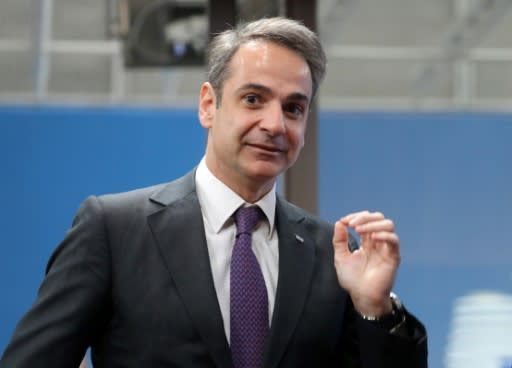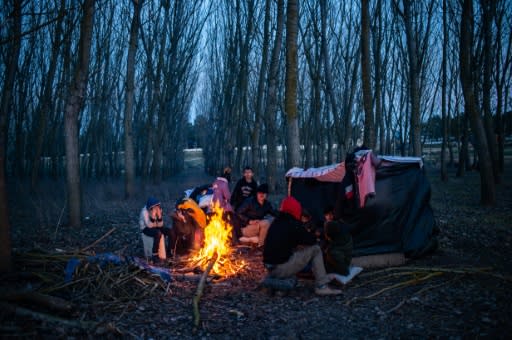Greeks fear 'invasion' of migrants across Turkish border
Greece was on a state of alert Sunday as it faced an influx of thousands of migrants seeking to cross the border from Turkey, with locals fearing a new immigration crisis. "This is an invasion," said Giorgos Karampatzakis, mayor of Marassia village, a common border crossing near the Evros River. More than 13,000 migrants have gathered on the Turkish side of the river which runs 200 kilometres (125 miles) along the frontier and separates them from Greece and therefore the European Union. The flow of migrants from Turkey has triggered EU fears of a re-run of the 2015 migrant emergency when Greece became the main EU entry point for a million migrants, most of them refugees fleeing the Syrian civil war. "This is what happened in 2015, it's repeating itself. Thousands at our borders, God help us," said a 63-year-old resident of the border village of Kastanies who gave her name only as Panayiota. Back then it was Greek islands like Lesbos and Chios that bore the brunt. - 'Endless migration crisis' - Turkish President Recep Tayyip Erdogan has raised the stakes by vowing to allow refugees to travel to Europe from NATO-member Turkey as a way to pressure EU governments over the Syrian conflict across its southern border. "What we are seeing is an endless migration crisis, what is Europe doing? What measures is it taking?" asked Yannis Siskoglou, a resident of Marassia. "There are thousands (of migrants) at the border and there is no return route for them," he told AFP. Greek police have been attempting to maintain calm and contain the flow of migrants, on Sunday using water cannon on them. Migrants pressed on with efforts to enter Greece. Some attempted to swim across rivers or duck under fences, while others dragged suitcases as they marched towards the border where large crowds of migrants waited, some wrapped in blankets or sleeping on dirt mounds. - Emergency meeting - Greek Prime Minister Kyriakos Mitsotakis called an emergency meeting with his foreign affairs and defence teams for Sunday evening to carve out a strategy. They decided to step up the level of deterrence at Greece's eastern borders to the maximum and to suspend submission of new asylum applications by those illegally entering the country for one month. Greek government spokesman Stelios Petsas on Sunday attacked Turkey over the situation. "Turkey, rather than controlling the migrant and refugee trafficking rings, has itself become a trafficker," he said in a statement. Petsas added that Turkey was using the people gathered at the border as "pawns", in order to exercise diplomatic pressure. "The current situation constitutes an active, serious, exceptional and asymmetric threat to the country's national security," Petsas said. Greek authorities have already boosted border patrols, using loudhailers to call on the migrants to stay on the Turkish side. The Greek government has also set up an automatic texting system for foreign mobile phones approaching the border, sending them the message: "Greece is maximising border security. Do not try to cross borders illegally." In the previous 24 hours, Greece blocked some 10,000 people from getting across its borders. Since 6:00 am on Sunday, a total of 5,500 people were barred from entering Greece illegally and 60 people were arrested and charged with illegally entering the country, government sources said late Sunday. However some people had managed to make their way across the Evros river, the source added. - Angry islanders - On the Greek islands, where a steady flow of inflatable dinghies and other crammed and unseaworthy craft arrived across the Aegean Sea in 2015, the locals have had enough. Despite Greece's efforts, a number of boats full of migrants arrived on the Greek island of Lesbos early Sunday. A group of local people on Lesbos managed to stop around 50 migrants, including children, from landing their boat after several hours at sea, an AFP photographer witnessed. Shouting "Go back to Turkey", furious locals at the port of Thermi blocked the boats and hurled insults at the local representative of the UN refugees agency, while others attacked journalists and photographers, hitting them and throwing cameras into the water. "We've got nothing against the refugees but... those who are prepared to come here must understand that this is how we will receive them now," said Despoina, a 47-year-old islander. On the road to the overcrowded Moria camp on the island, another group of local people used chains and rocks to try to block the route of a police bus transporting migrants who arrived Sunday, the Greek news agency ANA reported. "The anger of the people of Moria is justified," said south Lesbos mayor Taxiarchis Verros. "Moria can't take any more arrivals." Greece blocked some 10,000 people from getting across its borders over a 24-hour period Greek police have been attempting to maintain calm and stem the flow of migrants Greek PM Kyriakos Mitsotakis called an emergency defence meeting "There are thousands (of migrants) at the border and there is no return route for them," a resident of the Marassia border town said





